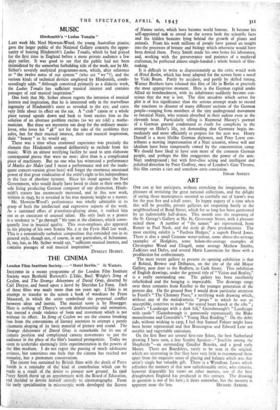London Film Institute Society.— "Hotel Berlin." At Warners.
THE CINEMA
INCLUDED in a recent programme of the London Film Institute Society were Berthold Bartosch's L'Idee, Basil Wright's Song of Ceylon, and The-Strange Adventure of David Gray, directed by Carl Dreyer, and based upon a novel by Sheridan Le Fanu. Each of these films was made more than ten years ago. L'Idie is an attempt to transfer to the screen a book of woodcuts by Frans Masereel, in which the artist symbolised the perpetual conflict between ideas and inertia. The musical score is by Honegger. Here is nothing of Disney's smooth draftsmanship and animation, but instead a crude violence of form and movement which is not without its effect. In Song. of Ceylon we see the cinema breaking free from the. conventions of literary narrative to attempt a purely cinematic shaping of its basic material of picture and sound. The Strange Adventure of David Gray is remarkable for its use of camera position and complicated camera movements to put the audience in the- place of the film's haunted protagonists. Today we seem to undertake alarmingly little experimentation in the powers of the film Medium. I do not regret the passing of much adolescent artiness, hut sometimes -one feels that the cinema has reached not maturity, but a premature conservatism.
The recent loss sustained by British films with the death of Percy Smith is a reminder of the- kind of contribution which can be made as a result of the desire to pioneer new ground. In 1908 Percy Smith threw up an appointment with the Board of Education, and decided to devote himself entirely to cinematography. From his early specialisation in microscopic work developed the Secrets
of Nature series, which have become world famous. It became his self-appointed task to reveal on the screen both the scientific facts and the hidden beauties lying behind the growth of plants and animals. From his work millions of people have gained an insight into the processes of botany and biology which otherwise would have been denied them. Percy Smith made his own home his laboratory, and, working with the perseverance and patience of a medieval craftsman, he perfected almost single-handed a whole branch of film- making.
It is difficult to write as dispassionately as the critic would wish of Hotel Berlin, which has been adapted for the screen from a novel by Vicki Baum. Partly by accident, and nerd}, by skilled timing, Warner Brothers have released this film of life in Berlin at precisely the most appropriate moment. Here is the Gelman capital under Allied air bombardment, with its inhabitants suddenly become con- scious that the war is lost. The slim anecdote which serves for plot is of less significance than the serious attempt made to record the reactions to disaster of many different' sections of the German people—ranging front members of the tiny underground movement to fanatical Nazis, who remain absorbed in their sadism even at the eleventh hour. Particularly telling is Raymond Massey's portrait of a German general condemned to death for complicity in the attempt on Hitler's life, yet demanding that Germany begin im- mediately and more efficiently to prepare for the next war. Henry Daniell is a most lifelike German diplomat, and Peter Lorre con- tributes a moving impersonation of a Nazi scientist, whose will and idealism have been temporarily cowed by the concentration camp. We should have liked to have seen more of the common German people, and perhaps the film exaggerates the power of the anti- Nazi Underground ; but with first-class acting and intelligent and polished direction by Peter Godfrey, Once of London's Gate Theatre, this film carries a rare and somehow eerie conviction.
EDGAR ANSTEY.


























 Previous page
Previous page